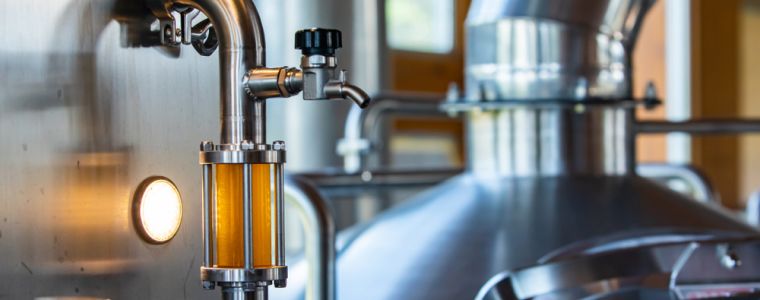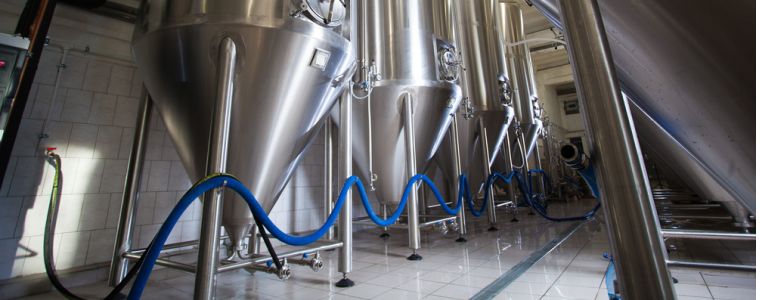Fermentation Vessels: Materials, Challenges and Alloys

Fermentation vessels are essential in pharmaceutical manufacturing, ensuring the quality and safety of drugs, vaccines and therapeutic treatments. They provide controlled environments for microbial fermentation, maintain sterility, monitor conditions, scale production and facilitate product purification.
What Are Fermentation Vessels?
Fermentation is defined as a biochemical synthesis of organic compounds by microorganisms. The process involves growing microorganisms within an enclosed tank (the Fermenter) under controlled conditions of aeration, agitation, temperature, and PH. The different types of organisms used as a basis for fermentation are bacteria (E. coli), yeasts, moulds, kidney cells, vaccines and viruses.
Fermentation vessels used in the pharmaceutical industry must provide a sterile environment for chemical reactions to take place or bio-organisms to grow. These products are then used in developing medical drugs, vaccines or other therapeutic treatments.
Challenges Faced With Fermentation Vessels

Fermentation vessels are fundamental in the production of various biotechnological products, including pharmaceuticals, biofuels and food additives.
However, producers encounter several challenges when designing and operating these vessels due to the complex nature of fermentation processes. Here are some of the key challenges faced:
1. Corrosive Nature of Chemicals:
Many fermentation processes involve corrosive chemicals or acidic environments, which can degrade vessel materials over time.
Example: In ethanol production, the acidic byproducts of fermentation can corrode stainless steel vessels, leading to contamination and equipment failure if not properly managed.
2. Heat Transfer Reactions:
Fermentation generates heat as a byproduct and efficient heat transfer is essential to maintain optimal process conditions.
Poor heat transfer can result in temperature fluctuations, affecting microbial growth rates and product yields.
Example: In beer brewing, inadequate heat removal during fermentation can lead to off-flavours and reduced product quality.
3. Pressure Conditions:
Some fermentation processes require specific pressure conditions to promote microbial growth or ensure product stability.
Controlling pressure within fermentation vessels is critical to prevent equipment damage and maintain process integrity.
Example: High-pressure fermentation is employed in the production of biofuels like biogas, where gas-tight vessels are necessary to withstand pressure buildup.
4. Sanitary Requirements:
Fermentation vessels must meet stringent sanitary standards to prevent microbial contamination and ensure product purity.
Regular cleaning and sterilisation procedures are essential to maintain hygienic conditions and comply with regulatory requirements.
Example: In pharmaceutical manufacturing, strict sanitation protocols are enforced to prevent the introduction of harmful microorganisms into drug products.
5. Fabrication Issues:
Designing and fabricating fermentation vessels that meet the diverse requirements of different fermentation processes can be challenging. Factors such as vessel geometry, material selection and construction techniques must be carefully considered to ensure optimal performance.
Example: Custom-designed fermentation vessels may be required for specialised applications, such as the production of biopharmaceuticals or probiotics, to accommodate specific process parameters and scale-up requirements.
Materials are selected based on the criteria above and their integrity in the operating environment to ensure minimum disruption in the production process, which is crucial to manufacturing success.
To obtain high efficiency and reliability, internal finishes of the material must also be strictly adhered to with a <0.4 um Ra (mirror finish) required. This level of polishing improves sanitary performance and exposes imperfections and pits which could lead to corrosion or pitting/crevice attack.
Alloys used in Fermentation Vessels

Fermentation vessels are critical components in bioprocessing industries, facilitating the cultivation of microorganisms for the production of various biotechnological products. The choice of material for these vessels is paramount, as it directly impacts factors such as corrosion resistance, mechanical strength and hygiene.
Here’s a detailed look at some commonly used materials for fermentation vessels and their suitability.
-
AL-6XN®
- Technical Specifications: AL-6XN® is a super-austenitic stainless steel with high levels of chromium, nickel, molybdenum, and nitrogen, providing exceptional corrosion resistance.
- Temperature Range: Suitable for temperatures ranging from -50°C to 300°C.
- Practical Applications: Widely used in pharmaceutical and biopharmaceutical manufacturing for fermenting biotherapeutic drugs, vaccines, and monoclonal antibodies. Its corrosion resistance makes it ideal for handling acidic solutions and saline environments.
-
Alloy 22
- Technical Specifications: Alloy 22 is a nickel-chromium-molybdenum-tungsten alloy with superior corrosion resistance in harsh chemical environments.
- Temperature Range: Can withstand temperatures from cryogenic to elevated levels, up to 600°C.
- Practical Applications: Employed in fermentation vessels for the production of antibiotics, enzymes and chemicals. Its resistance to corrosion in acidic and chloride-rich media ensures long-term reliability in pharmaceutical manufacturing processes.
-
Alloy C276
- Technical Specifications: Hastelloy C276 is a nickel-molybdenum-chromium alloy known for its outstanding corrosion resistance in aggressive environments.
- Temperature Range: Suitable for temperatures ranging from cryogenic to 400°C.
- Practical Applications: Utilised in fermentation vessels for the synthesis of biologics, including insulin, growth factors and recombinant proteins. Its resistance to oxidising and reducing acids, as well as chlorides, ensures durability and product purity in biopharmaceutical manufacturing.
-
Alloy 904L
- Technical Specifications: Alloy 904L is a high-alloy austenitic stainless steel with high levels of chromium, nickel, and molybdenum, offering excellent corrosion resistance.
- Temperature Range: Capable of withstanding temperatures from cryogenic to 400°C.
- Practical Applications: Commonly used in fermentation vessels for the production of vaccines, antibiotics, and therapeutic proteins. Its resistance to sulfuric acid, phosphoric acid and chloride ions ensures product integrity and process reliability in pharmaceutical manufacturing.
-
Alloy 316L
- Technical Specifications: Alloy 316L is a low-carbon, molybdenum-bearing austenitic stainless steel with enhanced corrosion resistance.
- Temperature Range: Suitable for temperatures ranging from cryogenic to 400°C.
- Practical Applications: Employed in fermentation vessels for the cultivation of probiotics, enzymes and biofuels. Its resistance to chloride corrosion and ease of fabrication make it a versatile choice for pharmaceutical and bioprocessing applications.
-
UNS S31803/2205
- Technical Specifications: Duplex stainless steel S31803/2205 is a dual-phase ferritic-austenitic alloy with high strength and corrosion resistance.
- Temperature Range: Capable of withstanding temperatures from cryogenic to 300°C.
- Practical Applications: Utilised in fermentation vessels for the production of biopharmaceuticals, such as monoclonal antibodies and therapeutic enzymes. Its resistance to stress corrosion cracking and pitting corrosion ensures the integrity and longevity of fermentation processes in pharmaceutical manufacturing.
The selection of materials for fermentation vessels depends on factors such as the nature of the process, the specific chemicals involved and the required mechanical properties.
By choosing the appropriate material based on these considerations, manufacturers can ensure the longevity, performance and safety of their fermentation vessels in bioprocessing applications.
Fermenting Vessel: Sanitary Requirements

In a fermenting vessel’s design, achieving a surface finish of less than 0.4 μm Ra (mirror finish) is crucial for ensuring optimal sanitary performance. This mirror-like surface finish plays a pivotal role in preventing contamination and corrosion in pharmaceutical and biopharmaceutical manufacturing processes.
Importance of Mirror-Finish
- Contamination Prevention: A mirror-finish surface leaves no room for bacteria or other microorganisms to adhere, reducing the risk of contamination during fermentation. This is vital for maintaining the purity of pharmaceutical and biopharmaceutical products.
- Corrosion Resistance: The smooth surface minimises the accumulation of corrosive substances, such as chemicals or acids, prolonging the lifespan of fermentation vessels and ensuring product integrity.
- Cleanability: The ultra-smooth surface simplifies cleaning procedures, allowing for thorough sanitation and sterilisation, which are essential in pharmaceutical manufacturing to meet stringent regulatory standards.
- Consistency: Uniform surface finishes ensure uniform contact with microbial cultures, promoting efficient fermentation processes and consistent product quality.
Difference Between Biopharmaceutical and Pharmaceutical

Biopharmaceuticals and pharmaceuticals differ in their manufacturing methods and the types of products they produce.
Biopharmaceuticals
- Manufacturing Methods: Biopharmaceuticals are typically produced through biological processes using living organisms or their cellular components. This includes the fermentation of microorganisms, such as bacteria or yeast, to produce therapeutic proteins, antibodies, vaccines, and other biologics.
- Specific Requirements: Any fermenting vessel used in biopharmaceutical manufacturing must meet stringent requirements for sterility, purity and product yield. Surface finishes with mirror-like smoothness are essential to prevent contamination and ensure the integrity of delicate biological molecules.
- Examples: Monoclonal antibodies, insulin, growth factors and vaccines are examples of biopharmaceutical products.
Pharmaceuticals
- Manufacturing Methods: Pharmaceuticals are primarily synthesised through chemical processes, involving the synthesis and purification of chemical compounds. This can include traditional chemical reactions or organic synthesis techniques.
- Specific Requirements: A fermenting vessel used in pharmaceutical manufacturing also requires high standards of cleanliness and corrosion resistance. However, the emphasis may be more on chemical compatibility and resistance to harsh process conditions rather than biological contamination.
- Examples: Drugs, antibiotics, antivirals, and small-molecule therapeutics are examples of pharmaceutical products.
While both biopharmaceutical and pharmaceutical manufacturing require fermentation vessels with high sanitary standards, the specific requirements may vary based on the nature of the products being produced and the manufacturing processes involved.
Regardless of the differences, achieving a mirror finish surface in fermentation vessels is essential for maintaining sanitary conditions and ensuring the quality and safety of pharmaceutical and biopharmaceutical products.
Fermentation vessels are vital in pharmaceutical and biopharmaceutical manufacturing, ensuring drug quality and safety. They provide controlled environments for microbial fermentation, maintain sterility, monitor conditions, scale production and aid in product purification. Let NeoNickel support you when choosing the neo-nickel alloy for your purpose. For help, technical assistance, sales and more get in touch.
FAQs
What is the best vessel for fermentation?
The choice of fermentation vessel depends on factors like process requirements and scale. Stainless steel fermenters are preferred for their durability and versatility, while glass fermenters offer visibility for small-scale applications.
Single-use bioreactors are gaining popularity for their flexibility and reduced contamination risk, particularly in biopharmaceutical production. Each vessel type has its advantages depending on the fermentation process and scale.
What is a large vessel in which fermentation is carried out called?
A fermenter, or bioreactor, is a vessel for fermentation. It ranges in size from small lab-scale to large industrial tanks, facilitating microbial growth and product production. Equipped with agitation, temperature, pH control, and gas exchange, fermenters are vital in biotech, pharmaceuticals and food industries.
What size is a fermentation vessel?
Fermentation vessels vary widely in size, from small lab-scale vessels for research to large industrial tanks for mass production. Sizes range from a few millilitres to tens of thousands of litres, depending on production needs and process scale.
What is the difference between biopharmaceutical and pharmaceutical?
The primary difference between biopharmaceutical and pharmaceutical is in the method of manufacturing. Biopharmaceuticals are based on living organisms such as mammalian cells, bacteria, fungi and yeast, whereas pharmaceuticals are synthesised through chemical processes.
———————————————————————————————————————————————
AL-6XN® is the registered trademark of Allegheny Ludlum Corporation.
———————————————————————————————————————————————
